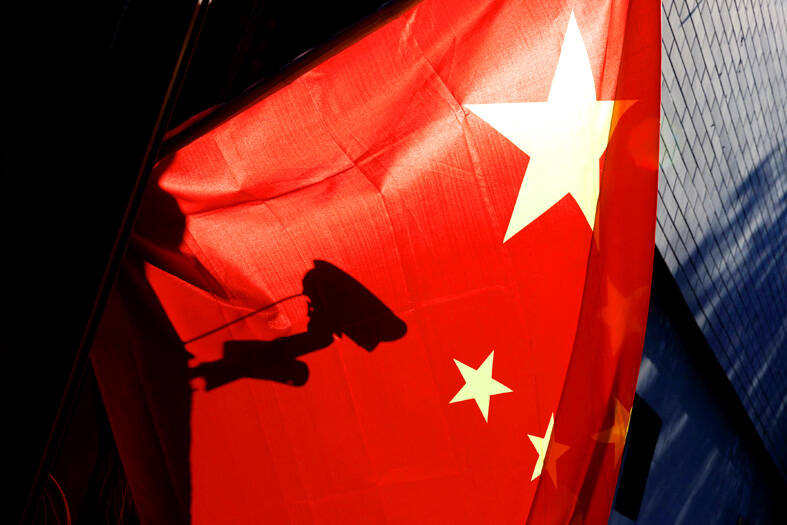A mere 9.3 percent of the Taiwanese public find China trustworthy, and 82.7 percent think that the Chinese threat has intensified over the years, a survey released on Monday by Academia Sinica showed.
In the poll conducted from Sept. 14 to 19, the Institute of European and American Studies asked 1,211 Taiwanese adults about US-Taiwan-China relations, the effectiveness of the US’ security commitment, their perception of the “status quo,” and Taiwan’s economic and national security.
Compared with 13.5 percent in 2021, the latest survey showed that only 9.3 percent of respondents believed China was a trustworthy country, while 26.4 percent disagreed and 57.6 percent said they strongly disagreed.

Photo: Reuters
At the same time, the number of respondents who believed the US was trustworthy also tumbled from 45.35 percent in 2021 to 33.9 percent, while 55.3 percent deemed the US not trustworthy.
Pan Hsin-hsin (潘欣欣), an assistant professor at Soochow University’s Department of Sociology, attributed the decline in trust to the US’ reaction to the Russia-Ukraine war.
Washington’s response to the Russian invasion gave Taiwanese an insight into how the US might react should a war break out between Taiwan and China, Pan said.
The survey also showed that 55.7 percent of respondents agreed that the US has been stepping up measures to guarantee Taiwan’s safety over the past few years.
Moreover, 64.4 percent supported regular patrols and flybys of US military ships and planes through the Taiwan Strait, while 65.4 percent believed the US president’s pledge to protect Taiwan.
Meanwhile, 59.6 percent of respondents believed that visits by top US officials to Taiwan enhances the possibility of US forces assisting Taiwan when needed.
The survey also showed that 44.6 percent of respondents supported the idea that Taiwan’s semiconductor industry serves as a “silicon shield” and that the chip shortage during the COVID-19 pandemic underscored the importance of Taiwan Semiconductor Manufacturing Co (TSMC, 台積電), which could prompt the US to send forces to assist Taiwan, Academia Sinica assistant researcher James Lee (李語堂) said.
However, 47.9 percent of respondents thought otherwise, the survey showed.
As for Taiwan’s status, the vast majority of respondents, at 91.4 percent, supported maintaining the “status quo.”
More than half of respondents thought of the country’s name as the “Republic of China” or the “Republic of China (Taiwan).”
With regard to identity, 62.5 percent considered themselves Taiwanese, 2.3 percent thought of themselves as Chinese and 32.2 percent identified as both.
The survey was conducted by the Election Study Center at National Chengchi University via telephone interviews.

INVESTIGATION: The case is the latest instance of a DPP figure being implicated in an espionage network accused of allegedly leaking information to Chinese intelligence Democratic Progressive Party (DPP) member Ho Jen-chieh (何仁傑) was detained and held incommunicado yesterday on suspicion of spying for China during his tenure as assistant to then-minister of foreign affairs Joseph Wu (吳釗燮). The Taipei District Prosecutors’ Office said Ho was implicated during its investigation into alleged spying activities by former Presidential Office consultant Wu Shang-yu (吳尚雨). Prosecutors said there is reason to believe Ho breached the National Security Act (國家安全法) by leaking classified Ministry of Foreign Affairs information to Chinese intelligence. Following interrogation, prosecutors petitioned the Taipei District Court to detain Ho, citing concerns over potential collusion or tampering of evidence. The

NEGOTIATIONS: Taiwan has good relations with Washington and the outlook for the negotiations looks promising, Minister of Economic Affairs J.W. Kuo said Taiwan’s GDP growth this year is expected to decrease by 0.43 to 1.61 percentage points due to the effects of US tariffs, National Development Council (NDC) Minister Paul Liu (劉鏡清) said at a meeting of the legislature’s Economics Committee in Taipei yesterday, citing a preliminary estimate by a private research institution. Taiwan’s economy would be significantly affected by the 32 percent “reciprocal” tariffs slapped by the US, which took effect yesterday, Liu said, adding that GDP growth could fall below 3 percent and potentially even dip below 2 percent to 1.53 percent this year. The council has commissioned another institution

NEGOTIATIONS: The US response to the countermeasures and plans Taiwan presented has been positive, including boosting procurement and investment, the president said Taiwan is included in the first group for trade negotiations with the US, President William Lai (賴清德) said yesterday, as he seeks to shield Taiwanese exporters from a 32 percent tariff. In Washington, US Trade Representative Jamieson Greer said in an interview on Fox News on Thursday that he would speak to his Taiwanese and Israeli counterparts yesterday about tariffs after holding a long discussion with the Vietnamese earlier. US President Donald Trump on Wednesday postponed punishing levies on multiple trade partners, including Taiwan, for three months after trillions of US dollars were wiped off global markets. He has maintained a 10 percent

TRADE: The premier pledged safeguards on ‘Made in Taiwan’ labeling, anti-dumping measures and stricter export controls to strengthen its position in trade talks Products labeled “made in Taiwan” must be genuinely made in Taiwan, Premier Cho Jung-tai (卓榮泰) said yesterday, vowing to enforce strict safeguards against “origin laundering” and initiate anti-dumping investigations to prevent China dumping its products in Taiwan. Cho made the remarks in a discussion session with representatives from industries in Kaohsiung. In response to the US government’s recent announcement of “reciprocal” tariffs on its trading partners, President William Lai (賴清德) and Cho last week began a series of consultations with industry leaders nationwide to gather feedback and address concerns. Taiwanese and US officials held a videoconference on Friday evening to discuss the